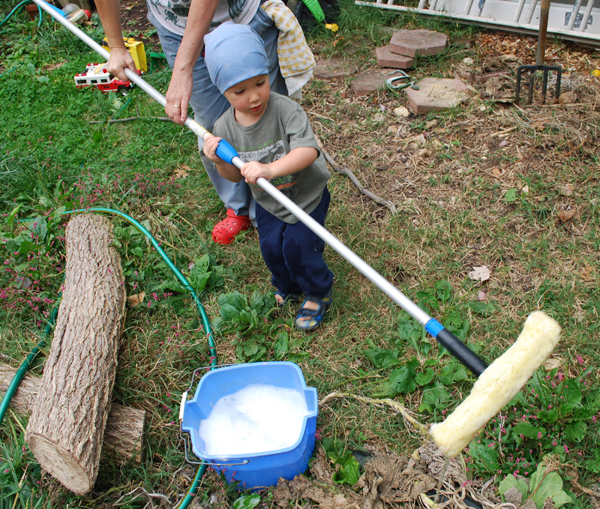by Janet Dittmer
When I was a child, I didn’t know anyone who wanted to be a maid when she grew up. My friends and I may have daydreamed about having a maid someday, but we certainly never considered being one.
The reasons were obvious. We didn’t want a job that was considered dull, repetitive, and menial; or one that demanded hard work for low pay. To us, it all sounded pretty unappealing—being ordered around, cleaning up after other people all day long, and having only brooms and mops for on-the-job companions.
But since I’ve had children, I have found it much harder to avoid being a maid than I once thought. I can go around my house picking up puzzle pieces, clothes, toys, crayons, shoes, food, and books from off the floor, only to find myself an hour later picking up puzzle pieces, clothes, toys, crayons, shoes, food, and books. It seems that ordering me around is almost second nature to my children: “Find me my socks!” “Give me some milk!” “Bring me my doll!” And I really feel like a maid when everyone else in the family is lolling around enjoying life, while I’m the only one who cares how the house looks and the only one who does anything about it.
But I don’t want to be a maid now any more than I wanted to be one when I was young. And I’m beginning to learn that I don’t have to be one. With a change in perspective, I can be a manager instead.
Managers are respected because their work involves responsibility, skill, and tact. Managers have vision—they can see how the seemingly routine tasks of today can help an organization reach tomorrow’s goals. Managers don’t just decide that something has to be done; they plan how, when and by whom it must be done. Managers make each person feel valued and important, and encourage these individuals to work together for the benefit of the whole.
Becoming a manager, leaving my maid behavior behind, is not an overnight change. It has taken me awhile to convince myself that teaching, training, and involving children in housework as a manager is preferable to doing it alone like a maid. After all, when I work by myself, jobs are done better, more quickly, and without hearing protests and complaints (“It’s not fair—my chore is harder than his chore”). But as a manager, I persist in involving others, knowing that what is being taught goes far beyond simple household tasks. We’re learning about family cooperation—responsibility, and pride in a job well done—long range benefits that are well worth the short-term inconveniences.

When I’m a manager I not only decide that a task will be done, but I also can choose which hour of the day and which day of the week to do any of my responsibilities. And only my imagination limits how I will carry them out. For example, I can do the laundry in the morning or late at night, every day or once a week. I could have children fold clothes and put them away to teach about follow-through, or I could help a young child practice matching skills using the family’s socks. If I don’t want to involve a child, and would rather use the laundry time as an opportunity to be alone and think, it doesn’t mean that I’ve reverted back to maid status. I’m always the manager as long as I’m in control and each household task is what I decide it will be.
When I’m the manager, my most important responsibility is not for tasks (such as housecleaning) or for products (like the evening meal). My foremost priority is the people in my family. It’s true that meals need to be cooked, clothes laundered, and the house kept clean, but I have to remember that the reason I do those tasks is to make the home a pleasant environment for my family. I want my family to understand this concept, too. They help with chores, not to please Mom or to be her slave, but because it benefits them and helps the home be a happier, more comfortable place for everyone. When people are my priority, I think of my job as one of teaching, loving, and encouraging, rather than one of scrubbing, washing, and cooking.
I have found that it’s not my family who decides whether I’m going to be a manager or a maid. Rather, I decide which job I want, and my family responds accordingly. When I act like a maid, they order me around like a maid. When I act like a manager, they respect me for the perspective and creativity I bring to my job. I’m convinced that even though my children enjoy the convenience of having a maid wait on them, they are much happier when I’m providing direction in my role as manager. I’m much happier, too. When I choose to be a manager instead of a maid, I enjoy striving for long-term goals while working to meet short-term needs. It is challenging to do a job that requires foresight, leadership, and interpersonal skills. I also appreciate the teamwork, cooperation, and mutual respect I feel among family members. Trying to be a manager instead of a maid has perhaps most of all helped me understand how I relate to the people in my family. When I act like a maid, picking up after everyone and cleaning up for everyone, people are my problem. But when I serve as a manager, guiding and encouraging my family to work harmoniously together, people are my purpose.
© 1986, 1992 by Janet Dittmer. First published in What's a Smart Woman like you doing at Home?. Janet is one of the three co-founders of Mothers at Home (the original name of the organization Family and Home Network).